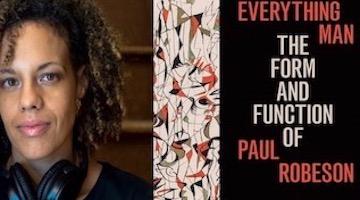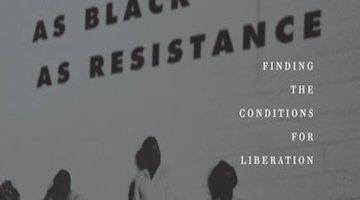An overview of recent Black books that can help us get through the year ahead.
This time last year, we introduced The Black Agenda Review’s first book round-up by asserting that it was “worth remembering that neither the pandemic nor the presidency represent a decisive break with or a radical deviation from past history and policy.” Unfortunately, but unsurprisingly, the past year has proven us correct. Trump may have reluctantly left the office of the US presidency, but Biden has done little to remove the lingering, sulphuric reek of fascism. Voting rights for millions of US citizens are imperiled while the right-wing January 6th “insurrection” is being recast by many as a Cub Scout sleep-over gone wild. Inflation in the US is hitting historic levels and, while the government has provided much financial relief for corporations, it has done little to help the citizenry. African countries have been subjected to a travel ban, despite the reality that it is western countries that are sick. Title 42, which uses the pandemic as cover for denying people asylum remains in effect and deportations are at record highs, including 150 deportation flights to Port-au-Prince, carrying some 15,000 Haitians in the past year. The US COVID death count has skyrocketed towards one million people – one fucking million people dead –while European numbers follow close behind.
Meanwhile, the US continues to feed its war machine with the latest $778 billion dollar bounty for the Pentagon and its venal contractors, an investment that will most likely fund attacks on Russia, China, Iran, Nicaragua, Venezuela, Cuba, or Ethiopia – depending on how Biden’s polling numbers go. SOUTHCOM and AFRICOM continue their belligerent flexing while racist white states Australia, England, and US have signed a pact (AUKUS) in a desperate attempt to show the world who’s who in the Pacific.
On the environmental front, at the UN Climate Change Conference (COP26) the world’s governments promised efforts to slow down global warming. Their promises appear to be much too little, and far too late. The past year witnessed the drastic acceleration of extreme weather events and globally, the weather has become predictably unpredictable. Seasons around the world have been upended by radially oscillating temperatures. Record rainfall driven by “atmospheric rivers” drenched regions that had just suffered through an other-worldly, thermometer-bursting “heat dome” that baked marine life and caused unprecedented wildfires that have razed entire towns. In the US, Biden’s eager approval of gas and oil drilling permits isn’t helping things. But perhaps the shattering of an Antarctic ice shelf and the breaking off of the Florida-sized Thwaites Glacier might get people's attention, especially once Miami and other coastal cities are completely submerged.
No matter, though, we have a Black vice president, a Black Secretary of Defense, and, following the example of Chicago, a Black cop was elected Mayor of New York City. We also have a global Black neocolonial class dutifully carrying water for the rogues of the west. It may be fascism and imperialism, but at least it's intersectional.
So with all of that, here are some excellent recent books to help you make sense of it all.
Ajamu Uni’s A Guide for Organizing Defense against White Supremacist, Patriarchal, and Fascist Violence (2021) does more than help make sense of the current moment – it offers a blueprint to fight against it. Uni’s self-published, seventy-six page manifesto provides a step-by-step guide on how to organize block by block and community by community, while delivering the kind of internationalist anti-imperialist methodology necessary to Pan-African solidarity.
During the 1970s, the Third World Women’s Alliance (TWWA) revised the vocabularies of white feminism and challenged the assumptions of Black Power by theorizing the “triple jeopardy” of race, gender, and class opression – now folded into the idea of intersectionality in the US – experienced by women of color. In We Were There: The Third World Women’s Alliance and the Second Wave (Feminist Press, 2021), TTWA member Patricia Romney combines first-person recollection with archival research and oral history to recount the story of the TWWA, documenting its formation, and its activist interventions on a range of issues, from sterlization and abortion rights to militarism and US foreign policy.
Port-au-Prince publisher C3 Editions has done the radical world a massive favor by re-issuing two critical texts by the twentieth century’s most important Haitian Marxist, Jacques Stephen Alexis. Alexis founded the left-wing People's Consensus Party (Parti pour l'Entente Nationale, or PEP) in the earlier years of the Duvalier dictatorship, was forced into exile, and upon his return to Haiti in 1961 was tortured and murdered by the Ton Ton Macoutes. Though perhaps best known for his novels, Alexis wrote the Manifeste du PEP, with its radical accounting of class struggle in Haiti, and Le marxisme, seul guide possible de la révolution haïtienne (2021)– a document whose title says it all: Marxism: the only possible guide to the Haitian revolution. Mèsi ampil, C3.
Ugandan activist and academic Sylvia Tamale’s Decolonization and Afro-Feminism (Daraja, 2020) is a heavy-weight collection of essays and commentaries that interrogate a fundamental paradox that continues to plague independent Africa: how have many of the patriarchally-structural psychological and political-economic registers of colonialism and imperialism managed to survive and persist? Tamale not only argues that the project of African decolonization has remained unfinished, but that it can only be driven towards completion through a re-invigorated Pan-Africanism that embrraces what she calls an “Afro-feminist” politics.
Historian Yveline Alexis’s Haiti Fights Back: The Life and Legacy of Charlemagne Péralte (Rutgers, 2021) is the first English-language account of the guerilla war fought by Haitian peasants against US Marines in the early days of the US military occupation of Haiti (1915-1934). Alexis focuses on the life and memories of the legendary rebel leader Charlemagne Peralte, while drawing readers into the insurgent geographies of the cities of Hinche, Port-au-Prince, and Cap-Haïtien in the fight for Haitian sovereignty and against US imperialism. Haiti Fights Back is an important contribution to the history of Black resistance in the Americas.
Poet Norberto James Rawlings was a descendant of the despised enslaved Africans, often pejoratively called cocolos, who were brought from the English-speaking Caribbean to labor on sugar plantations in the Dominican Republic. His writing offered poetic documentation of the Cocolos, with perhaps his most famous poem, “Los inmigrantes” a moving tribute to his community. While Rawlings sadly passed away last January after a long battle with Parkinson’s disease, we are indebted to the excellent Dominican publishing house Cielo Naranja for issuing his Poesía complete (2020) and preserving his legacy for future generations.
Frank Chapman’s Marxist-Leninist Perspectives on Black Liberation and Socialism (Freedom Road Socialist Organization, 2021) is, quite simply, the best introductory text we have ever encountered that explains, in clear and direct language, the history and relevance of Marxist theory to Black liberation struggles. In straightforward prose, Chapman revisits the classical pantheon of Marxist writing – from Marx and Lenin to Du Bois and McKay – to demonstrate their importance for a materialist understanding of the history of capitalism and slavery, of race and class, of fascism and nationalism, and, ultimately, of Black revolution and freedom. Marxist-Leninist Perspectives on Black Liberation and Socialism eloquently and urgently proves that Marxism is not an irrelevant theory over-burdened by its European origins – and that Black liberation is not simply an abstraction, or as Chapman puts it, “a state of mind.”
Based on journal entries, memories, and her FBI files, Sometimes Farmgirls Become Revolutionaries (Black Classic Press, 2021) recounts Florence Louise Tate’s journey from her childhood in Jim Crow Tennessee to her pan-African activism in support of the Angolan Revolution. Tate worked as a journalist in Dayton, as a communications director for the African Liberation Day Coordinating Committee) and National Urban Coalition, and served on the staff during the political campaigns of both Marion Berry and Jesse Jackson. She also suffered from chronic depression and made her share of political mis-steps: she was ostracized for her support of Jonas Savimibi during the Angolan Civil War. A valuable account of Pan-Africanism, Tate’s story is engaging, if not always easy.
The global climate crisis will not be solved by the much-publicized project of a Green New Deal. As Max Ajl argues, the Green New Deal is an ideologically limited, reformist project that does little to address the two systems – capitalism and imperialism – that have brought us to the ecological brink. In response, Ajl proposes “A People's Green New Deal,” a radical anti-imperialist and anti-capitalist alternative that centers the working class, upends corporate agriculture, and obliterates the modes of rapacious exploitation baked into North-South relations. If radical proposals are needed to save the earth, Ajl’s A People's Green New Deal (Pluto, 2021), is a good place to start.
Last but certainly not least is The Black Agenda (Or Books, 2021), a jaw-dropping collection of the incisive, incendiary interventions by the late Glen Ford. Ford eviscerates the empty, performative posturing of the Democratic Party, the “more effective evil” of the Obama presidency, and the ongoing bankruptcy and corruption of the “Black Misleadership class.” Ranging from New Orleans to Detroit and the Congo to Libya, Ford remains the go to from the class politics of Black life and the imbrications of domestic racism with US militarism and imperialism. More than ever, Ford’s voice is urgently needed.
Also: Lucille Clifton, Generations: A Memoir (NYRB, 2021). António Tomás, Amílcar Cabral: The Life of a Reluctant Nationalist (Hurst, 2021). Marisol Lebrón, Against Muerto Rico: Lessons from the Verano Boricua /Contra Muerto Rico: lecciones del Verano Boricua (Editora Educación Emergente, 2021). Olúfẹ́mi Táíwò, Against Decolonisation: Taking African Agency Seriously (Hurst, 2022). Karigo Muchai, Mohamed Mathu, Ngugi Kabiru, Life Histories from the Revolution: Three militants from the Kenya Land and Freedom Army tell their stories (Darja Press & Zand Graphics, 2021). Sadri Khiari, The Colonial Counter-Revolution in France: From de Gaulle to Sarkozy (MIT Press, 2021). Susan Williams, White Malice: The CIA and the Neocolonisation of Africa (Hurst, 2021). Erna Brodber and Velma Pollard, Folklore and Culture in Jamaica (Mississippi, 2021). Lorenzo Kom’boa Ervin, Anarchism and the Black Revolution: The Definitive Edition (Pluto, 2021). González García Iván, ¡BENKOS! El Héroe de la Matuna (Magisterio, 2016).
All images are of New Beacon Books, London’s oldest Black bookstore. Founded in 1966, the pandemic almost forced it to permanently close. It was only saved through a successful crowd-funding operation.















